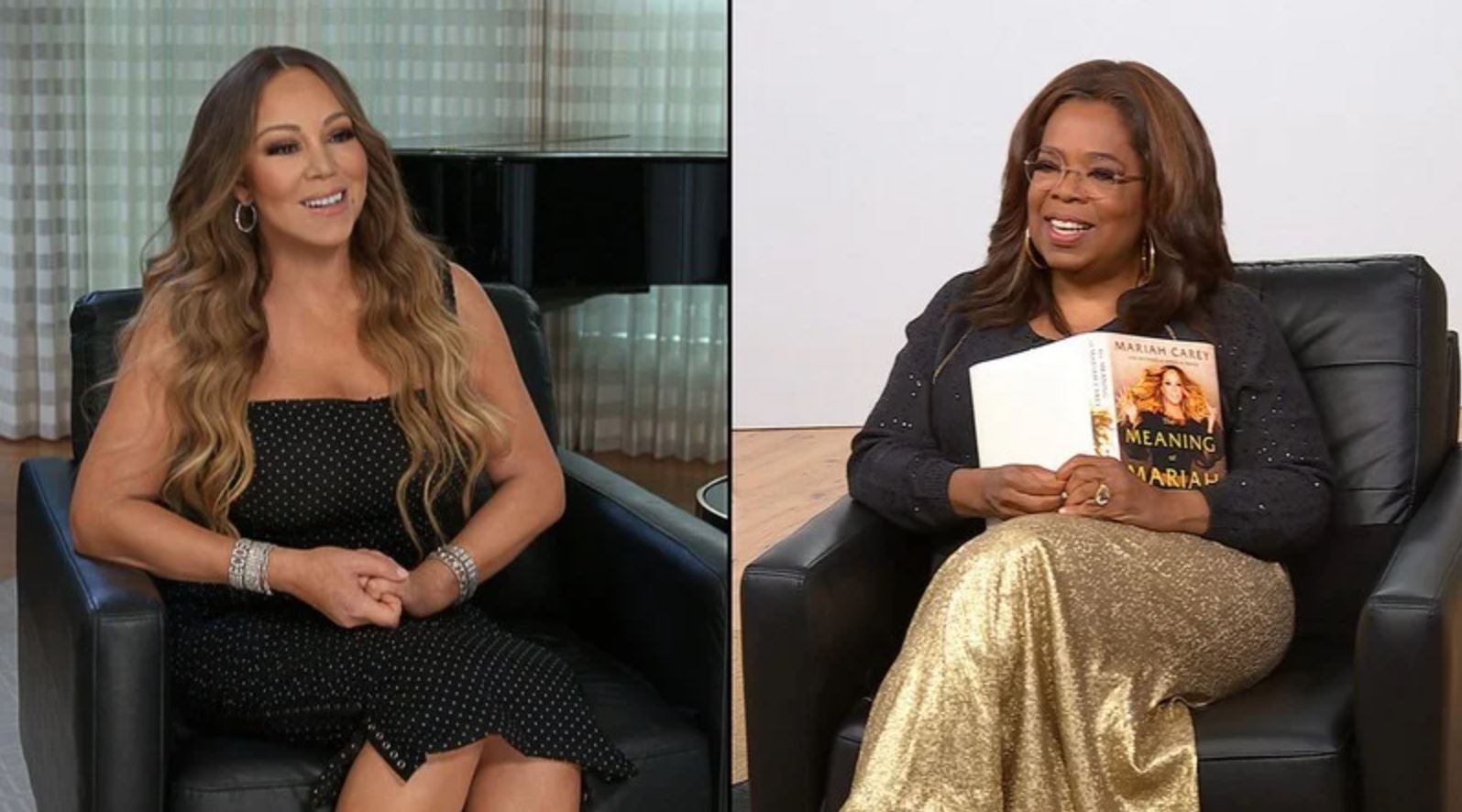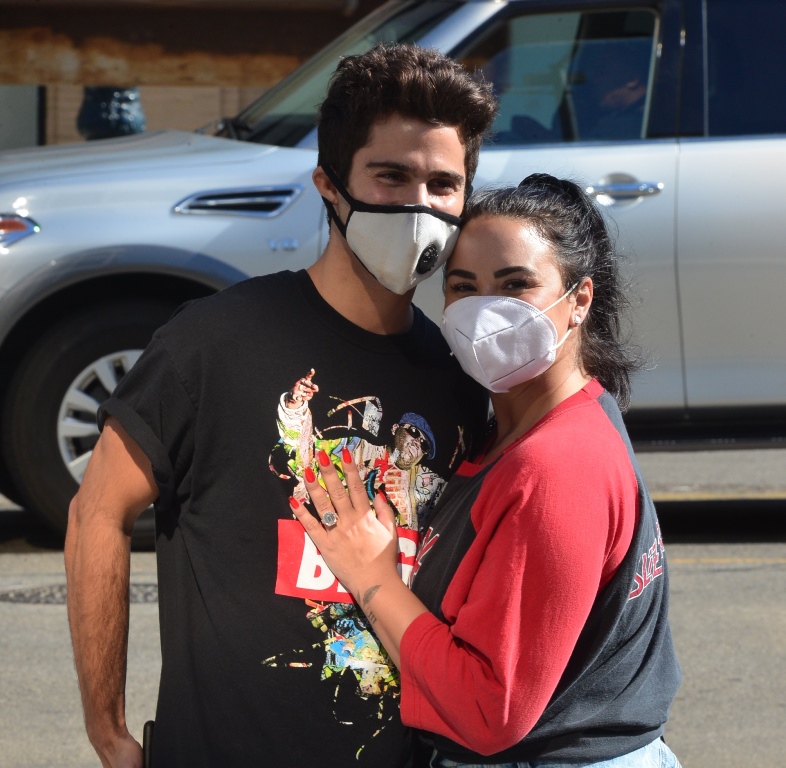Mariah & Oprah



When I heard Mariah Carey was sitting down with Oprah to promote her memoir The Meaning of Mariah Carey (which comes out tomorrow) I was ready to inject it in my veins. Mariah Carey’s The Emancipation of Mimi is one of the defining albums of my childhood and The Oprah Winfrey Show is one of the reasons I chose a career in TV. I pre-ordered Mariah’s book a few weeks ago and now, after watching The Oprah Conversation, I cannot wait for it to arrive.
This was a chat with Mariah Carey, the person, not Mariah Carey, the diva, and that was the best part. We love all the extra-ness that is Mariah, but the value in her memoir is pulling back the curtain on the real person who creates the magic that we’ve loved for 30 years. Oprah, who said she’s interviewed the singer nine times over the years, reveals she always got the impression that Mariah was sad and lonely, but not ready to reveal why. Now she’s ready.
“People have drawn first blood with me, historically […] I wouldn’t have gone here if things hadn’t been done to me, if I hadn’t been dragged by certain people and treated as an ATM machine with a wig on.”
It was a socially distanced interview, with Mimi and Ms. O chatting to each other via video, but the production value was still there. Mariah needs more than a ring light for an 80 minute interview. She was in full glam speaking to a life-sized Oprah on a giant TV screen in front of her. Oprah had the same setup, and I need TV networks to start mimicking this. I’ve seen James Corden shooting some of his interviews in a similar way, where he’s in studio and his guess appears on monitor in front of him. We’re going to be in this pandemic for a while, and the Zoom call interviews have become so tiresome.
Despite talking via video, the chemistry was there. The whole thing made me nostalgic for the one-hour Oprah Interview of the late 90s/early 2000s. It was interesting to see Mariah promoting the book in a way that’s fallen out of style, for some, especially given the social media marketing campaign, complete with viral tweets, that’s been going so well. But you have to target your older fans and younger fans too, when you’re an artist like Mariah. One of the best examples of her social media team working their magic was this promo for this Oprah interview, recreating an infamous moment when Oprah clearly didn’t know the words to Mariah’s song. It’s about leaning into the meme.
Going all the way back to her childhood, Mariah outlines several stories included in the book in which she felt like an outcast, because of her race. In one instance, her mother (who is white) dropped her and her friend (who is also white) off at her father’s house, and when he opened the door to greet them, Mariah’s friend burst into tears. Mariah says that it was clear that the friend was scared of her Black father. The girl’s mother whisked her away and Mariah and her father never spoke of it. In another instance, Mariah was in junior high and a group of girls she thought were her friends took her on a cottage-style getaway only to berate her with insults and call her the n-word when they got there. She couldn’t leave because she was nowhere near home, so she just cried and took it, and internalized it for years. Mariah says she did get some sense of revenge after she found success and visited one those girls who she says viewed her as “that mulatto bitch from down the street.”
Oprah raises an interesting point when she says that as a “brown-skinned girl” she grew up envying girls who looked like Mariah — Black girls with lighter skin and “pretty” hair. That kind of colourism in the Black community makes it so that light-skinned people are seen as having it easier. Not only are their looks envied, but they’re more palatable in white spaces, and less likely to deal with racism. While that can be true, it doesn’t mean they’re untouched by racism. Even people as light as Mariah Carey experience racism. And sometimes when you’re biracial, you’re ‘too Black for white people, and too white for Black people.’
“My situation has just made me feel like an outcast. It just made me feel like I didn’t have a specific tribe to back me up.”
But those weren’t the only scars from her childhood. Mariah’s rocky relationship with her mother has been well documented. In the book Mariah says she was neglected, and Oprah asked her to define what that looked like.
“I would say the neglect was on several levels. I always felt dirty, I didn’t feel put together. Leaving me with people that were not safe. And also being one of those people that wasn’t always safe for me either, emotionally.”
I never thought I’d hear the diva, Mariah Carey, talking about being a dirty child, but it’s that kind of candor that made the interview so great, and makes me excited for the book. She says her hair was never brushed, and the curls would matte together because her mother had straight silky hair, and no idea how to care for Mariah’s. At one point her Black aunts tried straightening her hair with a hot comb and gave up after burning off a piece. But Mariah says it was nice that they at least tried, because no one was trying.
There’s just so much in her childhood, from her brother, who she says was extremely violent, to her father who was, at one point, falsely accused of raping a white woman. It’s no wonder that she found herself in an unhealthy relationship with Tommy Mottola, the former Chairman and CEO of Sony Music. This marriage was before my time so Mariah’s account of being a prisoner in her own home, and constantly under surveillance was pretty shocking.
“I feel like I’m entitled to tell my story, and I feel like I was kind enough — as kind as possible, to the people who may or may not have been kind to me. So for [Tommy] specifically, I forgive him. It’s the truth. I’m not the only one who knows this. That’s the thing. There were witnesses to this. So to me, this shouldn’t be a surprise. If anything, I don’t think I went in like some people would have.”
Despite how terrible that marriage was, Mariah didn’t seemed embarrassed about it at all. Which was nice to see, because it’s not her fault. She acknowledges it as an important part of her life, and calls herself a willing participant. Although I wouldn’t agree with that second part — even Tommy Mottola has since called the relationship "absolutely wrong and inappropriate.” She will admit she still lives with side effects from that relationship, even today, especially when it comes to dealing with power dynamics, telling Oprah she wasn’t necessarily in love with him, but she loved that he believed in her so much. However, when talk turned to her second marriage with Nick Cannon, that’s when I felt like maybe she was a little embarrassed about that one.
“Nick and I got married quickly. It was a sweet moment and we continue to co-parent. We can’t be responsible for each other’s every move or every word, but what I am responsible for is making sure that it’s a good environment when we’re all together…”
She was married to Nick Cannon for six years, and told Oprah it was a “sweet moment.” Not exactly language I would use to describe a former love of my life, and the father of my children, especially if you’re on good terms these days. But she continues downplaying it, like it was a summer fling.
"Me and Nick had a nice time and a cute romance and everything, and that was great, but we can still play a mean game of taboo or whatever, together with the kids and have fun. There’s no animosity, you know what I mean, and that’s the thing that I did not get to see with my parents.”
I watched the 80 minute interview twice this weekend, because I loved it, and I might as well make that free year of Apple TV+ work for me while it still can. Hopefully Mariah’s book will arrive in my mailbox tomorrow, and I can dig into that all week long. After this interview with Oprah, I know she’s not going to completely drag the people who have wronged her, but she is promising to address everything, and share the stories of Mariah Carey, the person.
